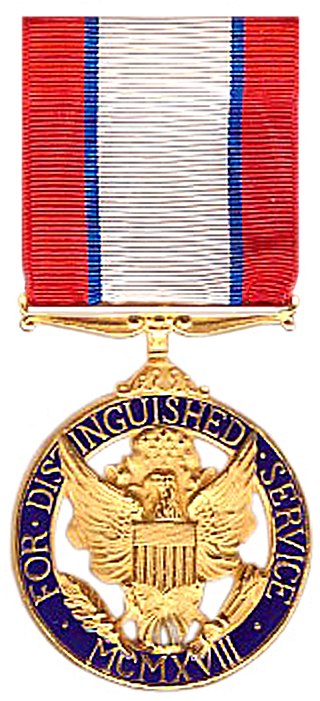
The Distinguished Service Medal (DSM) is a military decoration of the United States Army that is presented to soldiers who have distinguished themselves by exceptionally meritorious service to the government in a duty of great responsibility. The performance must be such as to merit recognition for service that is clearly exceptional. The exceptional performance of normal duty will not alone justify an award of this decoration.

The National War College (NWC) of the United States is a school in the National Defense University. It is housed in Roosevelt Hall on Fort Lesley J. McNair, Washington, D.C., the third-oldest Army post still active.

The Joint Chiefs of Staff (JCS) is the body of the most senior uniformed leaders within the United States Department of Defense, which advises the president of the United States, the secretary of defense, the Homeland Security Council and the National Security Council on military matters. The composition of the Joint Chiefs of Staff is defined by statute and consists of a chairman (CJCS), a vice chairman (VJCS), the chiefs of the Army, Marine Corps, Navy, Air Force, Space Force, and the chief of the National Guard Bureau. Each of the individual service chiefs, outside their JCS obligations, works directly under the secretaries of their respective military departments, e.g. the secretary of the Army, the secretary of the Navy, and the secretary of the Air Force.

The chairman of the Joint Chiefs of Staff (CJCS) is the presiding officer of the Joint Chiefs of Staff (JCS). The chairman is the highest-ranking and most senior military officer in the United States Armed Forces and the principal military advisor to the president, the National Security Council, the Homeland Security Council, and the secretary of defense. While the chairman of the Joint Chiefs of Staff outranks all other commissioned officers, the chairman is prohibited by law from having operational command authority over the armed forces; however, the chairman assists the president and the secretary of defense in exercising their command functions.
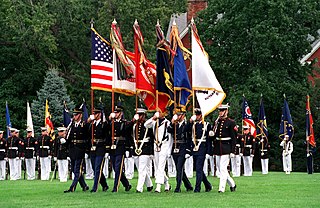
The several branches of the United States Armed Forces are represented by flags. Within the U.S. military, various flags fly on various occasions, and on various ships, bases, camps, and military academies.

The Naval War College is the staff college and "Home of Thought" for the United States Navy at Naval Station Newport in Newport, Rhode Island. The NWC educates and develops leaders, supports defining the future Navy and associated roles and missions, supports combat readiness, and strengthens global maritime partnerships.

The Naval Postgraduate School (NPS) is a public graduate school operated by the United States Navy and located in Monterey, California.
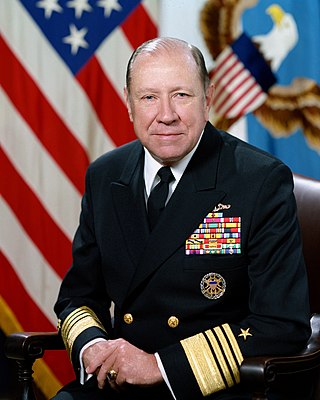
William James Crowe Jr. was a United States Navy admiral and diplomat who served as the 11th chairman of the Joint Chiefs of Staff under Presidents Ronald Reagan and George H. W. Bush, and as the ambassador to the United Kingdom and Chair of the Intelligence Oversight Board under President Bill Clinton.

Vice Admiral Robert Lee Ghormley was an admiral in the United States Navy who served as commander, South Pacific Area during World War II. Ghormley was long considered to be an ineffective leader–overly cautious, pessimistic, and even defeatist–but recent scholarship has argued that while he may not have been an inspiring leader, he performed well enough under difficult circumstances.
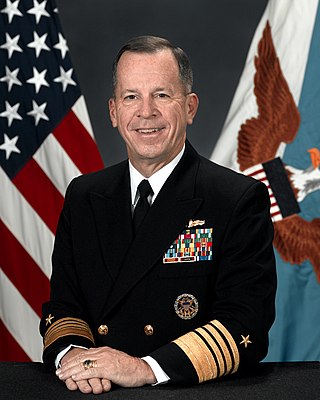
Michael Glenn Mullen is a retired United States Navy admiral who served as the 17th chairman of the Joint Chiefs of Staff from October 2007 to September 2011.

Harry Wilbur Hill was an admiral in the United States Navy during World War II.
Sea Frontiers were several, now disestablished, commands of the United States Navy as areas of defense against enemy vessels, especially submarines, along the U.S. coasts. They existed from 1 July 1941 until in some cases the 1970s. Sea Frontiers generally started at the shore of the United States and extended outwards into the sea for a nominal distance of two hundred miles.

Samuel Jones "Sam" Locklear III is a retired United States Navy admiral who last served as the commander of the United States Pacific Command from March 9, 2012, to May 27, 2015. Prior to that, he served as Commander, United States Naval Forces Europe – United States Naval Forces Africa and NATO's Commander, Allied Joint Force Command Naples. Prior to that, he served as Director, Navy Staff from July 2009 to October 2010. He retired from the navy on July 1, 2015, after 39 years of service.

Paul Frederick Zukunft is a retired admiral of the United States Coast Guard who served as the 25th commandant. He was confirmed by the U.S. Senate as the Commandant, with the rank of admiral, in May 2014 and relieved Robert J. Papp Jr. as commandant on 30 May 2014. Prior to his selection as Commandant, he served as Commander, Coast Guard Pacific Area. In this position, Zukunft was the operational commander for all U.S. Coast Guard missions within the half of the world that ranges from the Rocky Mountains to the waters off the East Coast of Africa. He concurrently served as Commander, Defense Force West and provided U.S. Coast Guard mission support to the U.S. Department of Defense and Combatant Commanders.

John Ashby Baldwin Jr. is a retired vice admiral of the United States Navy active during much of the Cold War. He commanded destroyers and a carrier battle group, saw service in the Vietnam War, served on the staffs of the Chief of Naval Operations, the Joint Chiefs of Staff, the Secretary of the Navy, and the Secretary of Defense, and was President of the Naval War College and of the National Defense University.
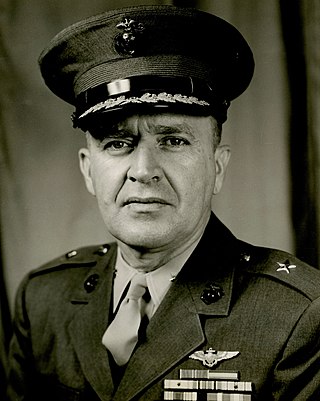
Roy Lewis Kline was a decorated naval aviator in the United States Marine Corps with the rank of brigadier general. A veteran of World War II, he distinguished himself as assistant air officer on the staff of Tenth Army during the Battle of Okinawa. Kline later served as Military Secretary to the Commandant of the Marine Corps, General Randolph M. Pate from 1958 to 1960.
MIT Seminar XXI is an educational program for national security professionals run by the Massachusetts Institute of Technology (MIT). Originally for military leaders when begun in 1986, leaders from various government, non-government, and private organizations attend the seminar. The seminar runs annually from September to April in the national capital region. MIT president Susan Hockfield called it a "legendary program".













